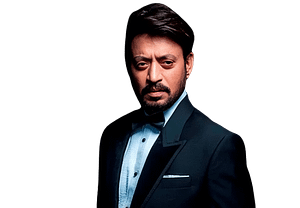Irfan Khan Life Of Biography

Sahabzade Irfan Ali Khan, globally known as Irfan Khan, was a name that transcended the boundaries of language and culture. Born on January 7, 1967, in Jaipur, Rajasthan, India, Irrfan was not just a gifted actor but also a deeply philosophical individual who viewed cinema as a medium to interpret life. Over his illustrious career, which spanned over three decades, he made an indelible mark in Bollywood, Hollywood, and global cinema. Although he once aspired to be a cricketer, destiny had other plans — steering him toward acting, where he would become one of the most respected actors in the world.
Irfan Khan Early Life and Education
Irfan Khan was born into a Pathan family in Jaipur. His father, Sahabzada Yaseen Ali Khan, ran a tire business and was a zamindar (landowner) in the Tonk district of Rajasthan. His mother, Begum Khan, came from the Tonk hakim family, known for their aristocratic heritage.
From an early age, Irfan exhibited curiosity and a thoughtful nature. However, he was also quite reserved, often lost in books and ideas rather than engaging in loud or expressive interactions. He completed his schooling in Jaipur, showing great interest in literature, history, and sports — particularly cricket.
Irfan Khan Early Cricket Aspirations
Interestingly, Irfan’s first ambition was to become a cricketer. He was a talented all-rounder and even got selected for the CK Nayudu Trophy, a stepping stone to professional cricket in India. However, his dreams were dashed due to lack of finances — he couldn’t afford to travel and stay in other cities for training. Though the passion faded, the discipline and resilience of a sportsman would remain embedded in his personality.
Journey into Acting and Education at NSD
Despite the end of his cricketing hopes, Irrfan found another calling: theatre and acting. With the encouragement of his maternal uncle, he pursued drama. He was awarded a scholarship to the prestigious National School of Drama (NSD) in New Delhi in 1984, one of the most elite acting institutions in India.
At NSD, Irfan trained rigorously in classical theatre, honing his skills under the guidance of legends like Ebrahim Alkazi and Ram Gopal Bajaj. Among his batchmates were actors like Naseeruddin Shah, Anupam Kher, and Piyush Mishra. These formative years deeply shaped Irfan’s nuanced style of acting, where he learned to emote with silence as much as with dialogue.
Early Career Struggles: TV and Small Roles (1988–2000)
Post-NSD, Irfan moved to Mumbai and began working in television serials, which were booming in the late 1980s and early 1990s. He acted in notable shows such as:
- “Chanakya” (as Senapati Bhadrashaal)
- “Bharat Ek Khoj”
- “Chandrakanta”
- “Banegi Apni Baat”
- “Sara Jahan Hamara”
Despite his talent, Irfan found it difficult to land significant roles in films. His unconventional looks and subtle acting were considered “non-commercial” by the Bollywood industry of the ’90s.
His film debut came with a minor role in Mira Nair’s Salaam Bombay! (1988), but his scenes were eventually cut. He spent the next decade working in television and doing small parts in films like Ek Doctor Ki Maut (1990) and Such a Long Journey (1998).
Breakthrough in Bollywood: The Slow Rise (2001–2007)
The turning point came in 2001 with Asif Kapadia’s The Warrior — a British-Indian film that won international acclaim. Though not released in India initially, it garnered praise in the West and was even screened at Cannes and BAFTA.
Irfan’s real breakthrough in India came with “Haasil” (2003) directed by Tigmanshu Dhulia, where he played the antagonist with chilling intensity. This was followed by:
- Maqbool (2003) – A critically acclaimed adaptation of Shakespeare’s Macbeth
- Rog (2005)
- The Namesake (2006) – Directed by Mira Nair, marking his international credibility
- Life in a… Metro (2007) – Showcased his romantic and emotional depth
His unique ability to merge realism with drama made him stand apart from mainstream stars.
Hollywood Career and International Acclaim (2008–2018)
Irfan Khan’s career reached new heights with several major Hollywood projects, where he was praised for his quiet intensity and screen presence.
Key international films include:
- Slumdog Millionaire (2008) – Played a police inspector. The film won 8 Oscars.
- The Amazing Spider-Man (2012) – Played Rajit Ratha
- Life of Pi (2012) – Played the adult Pi Patel
- Jurassic World (2015) – Played Simon Masrani
- Inferno (2016) – Starred alongside Tom Hanks
His global appeal was unmatched for an Indian actor, and he maintained his roots in Indian cinema while conquering Hollywood.
Bollywood Stardom and Versatility (2012–2020)
Despite international success, Irfan continued to invest in strong Indian scripts. His roles were never repetitive — each performance brought something new.
Notable Indian films:
- Paan Singh Tomar (2012) – National Award-winning performance as the soldier-turned-bandit
- Lunchbox (2013) – Won global awards and acclaim
- Haider (2014) – Memorable cameo
- Piku (2015) – Alongside Deepika Padukone and Amitabh Bachchan
- Hindi Medium (2017) – Huge commercial success
- Karwaan (2018)
- Angrezi Medium (2020) – His final film
Irrfan’s choice of films reflected social realities, philosophical themes, and personal vulnerability.
Health Battle and Last Days
In March 2018, Irfan shocked the world by revealing he was diagnosed with a rare neuroendocrine tumor. He sought treatment in the UK and stayed away from the public eye for long periods.
Despite the illness, he completed “Angrezi Medium” (2020), which released just before COVID-19 lockdowns.
On April 29, 2020, Irfan Khan passed away at Kokilaben Hospital in Mumbai at the age of 53, due to complications related to colon infection.
His death was mourned across the globe. Personalities from Hollywood, Bollywood, and the film community paid rich tributes to the legend who brought grace and truth to the screen.
Personal Life
Irfan married his NSD batchmate Sutapa Sikdar, a writer and producer. The couple had two sons:
- Babil Khan – Now an actor, made his debut in Qala (2022)
- Ayaan Khan
He was known to be deeply spiritual, philosophical, and introspective. He practiced Sufism and was influenced by the teachings of Rumi and Osho.
Social Media Presence
Irfan was not overly active on social media, but he maintained a presence through:
- Twitter: @irrfank
- Instagram: @irrfan
- Facebook: @IrrfanOfficial
His social posts were often poetic, thoughtful, or health-related. His son Babil now manages tributes and memories through social media.
Net Worth and Business Ventures
At the time of his death in 2020, Irfan Khan’s estimated net worth was approximately ₹320 crore ($40 million USD).
Sources of Income:
- Film fees (Indian and international)
- Brand endorsements (though selective)
- Voiceovers and documentaries
- Investments in real estate
Properties:
- A luxurious house in Mumbai’s Oshiwara
- An ancestral home in Jaipur
- Investments in land and hospitality ventures (reportedly)
Irfan was not known for flamboyance. He lived a modest, reflective life, spending more on travel, books, and meaningful causes than on luxury.
Legacy and Honors
- National Film Award for Paan Singh Tomar
- Filmfare Awards (4 wins) for Haasil, Life in a… Metro, Paan Singh Tomar, Hindi Medium
- Padma Shri (2011) – India’s fourth-highest civilian award
- Named among the finest actors of the 21st century by critics across the globe
- Honored posthumously at the Oscars 2021, BAFTA 2021, and IFFI 2020
Conclusion
Irfan Khan was not just an actor — he was an experience. His art was quiet yet seismic. From losing out on cricket to redefining Indian cinema, his journey was about resilience, grace, and honesty. In a world of noise, he proved that silence can speak volumes.
He left behind not just films, but a philosophy: that art must reflect truth, and life, however short, must be lived authentically. As his iconic line from The Lunchbox goes:
“Sometimes the wrong train takes you to the right station.”
Irfan Khan’s train took him to immortality.



